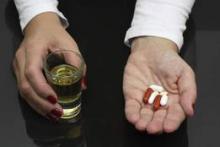Alcohol was involved in nearly one-quarter of all opioid pain reliever–related deaths and just over 20% of deaths related to benzodiazepines, according to a study of 2010 data released by the U.S. Food and Drug Administration and the Centers for Disease Control and Prevention.
Alcohol also was involved in nearly 20% of opioid abuse–related visits to the emergency department in that year, and over a quarter of visits for benzodiazepine drug abuse–related ones. Men were almost twice as likely as women to be admitted to the ED for alcohol/opioid abuse and slightly less than that for alcohol/benzodiazepine-related abuse.
Opioids such as hydrocodone mixed with acetaminophen (Vicodin) are commonly prescribed for chronic pain, while benzodiazepines such as diazepam (Valium) are often prescribed for anxiety disorders or insomnia. According to the CDC, in 2012 health care providers wrote 259 million prescriptions for painkillers or, put another way, one bottle of prescription painkillers for every adult in America. The report is based on an analysis of data reported in 2010 by 237 hospital EDs and medical examiners across 13 states to the Drug Abuse Warning Network, which is sponsored by the Substance Abuse and Mental Health Services Administration. Alcohol was involved in just over 22% of opioid and 21.4% of benzodiazepine drug-related deaths, and alcohol was involved in 18.5% of opioid and 27.2% of benzodiazepine drug abuse–related ED visits during the period reported, according to the analysis.
In all, there were 438,718 ED visits related to opioid abuse alone or in combination with other drugs: An estimated 81,365 (18.5%) of those visits involved alcohol. Another 408,021 ED visits were related to benzodiazepine abuse, alone or in combination with other drugs: Of those, 111,165 (27.2%) involved alcohol. When opioids or benzodiazepines were the only drug classes in question, alcohol was involved in 26,446 (13.8%) opioid visits and 38,244 (34.1%) benzodiazepine visits (MMWR 2014;63:881-5).
One-fifth of those admitted to the ED for opioid abuse when alcohol was involved were 30-44 years old (20.6%), and an almost equal percentage (20%) were 45-54 years old. For benzodiazepine-related events, 45- to 54-year-olds were admitted most often (31.1%). ED admissions of men for alcohol/opioid events were significantly more common than for women (22.9% and 13.5%, respectively).
Although the study did not include data on exactly how much alcohol was ingested per each reported ED visit, “these findings indicate that alcohol plays a significant role in [opioid pain reliever] and benzodiazepine abuse. Interventions to reduce the abuse of alcohol and these drugs alone and in combination are needed,” study author Christopher M. Jones, Pharm.D., of the FDA and his colleagues wrote.
The survey was conducted by the FDA and the CDC.
On Twitter @whitneymcknight

